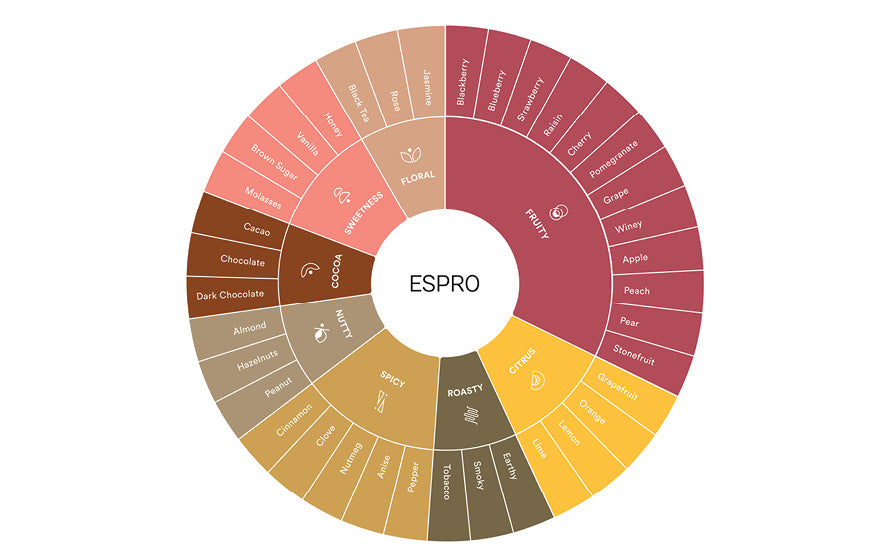Ask any non-coffee drinker why they don’t enjoy coffee and you’ll get the same response:
“It’s too bitter!”
But it’s not a complaint only of the uninitiated—even coffee connoisseurs complain about bitter notes in coffee from time to time. It happens to all of us.
You don’t have to let bitter coffee ruin your morning. With a few tricks up your sleeve, you can kiss bitter-tasting coffee goodbye for good.
We’ll show you:
- How to identify what bitter notes in coffee taste like
- 3 reasons why coffee can taste bitter (+ 3 ways to fix it)
- If the old wives’ tale about using salt in bitter coffee is true
- Which coffees tend to have more bitter notes than others
Follow our advice and you’ll never suffer through bitter coffee again!
How to Know Without a Doubt That Your Coffee is Bitter
Our taste buds are powerful little tools. They help us identify pleasant-tasting food and alert us when we’ve ingested something potentially toxic.
The human tongue can recognize five different flavor categories:
- Bitter
- Sweet
- Salty
- Sour
- Umami
Most people detect bitter notes in the back and center of the tongue. If you taste a strange, unpleasant flavor here, your coffee is bitter.
Read: Coffee Flavor 101: How to Taste Your Brew Like the Pros for Max Enjoyment
Don’t Confuse Sour Coffee for Bitter Coffee
It’s important to note that sour and bitter coffees do not taste the same.
Bitterness is a generally dry and displeasing taste toward the back of the palette, while sour-tasting notes are the result of acidity and have a more sharp flavor detected on the sides of the tongue.
Before you make any adjustments to your coffee or ask the barista to remake your drink, it’s important to understand if your coffee is bitter or sour. You don’t want to make the wrong brewing adjustment and cause your drink to taste worse!
You’ll see what we mean in just a second…
Side Note: Some Bitterness Is Good
Certain coffees are inherently bitter—and that’s a good thing! Bitterness can round out a complex flavor profile, balancing out certain acids or sweet notes.
Subtle bitterness in freshly roasted coffee can taste like:
- Dark chocolate
- Grapefruit
- Cocoa
- Licorice
When combined with other flavors, these bitter notes are delectable and produce a rich cup of coffee.
However, when the bitter notes mask the delicious flavors and make your coffee undrinkable, it’s time to find out what went wrong when brewing.
3 Reasons Why Your Coffee is Bitter
1. Over Extraction
At first glance, brewing coffee seems simple. Hot water + freshly ground coffee beans = coffee!
However, it’s a bit more complicated than that.
When we brew coffee, the acids, sugars, oils, and other flavors held inside the grounds are dissolved into the final cup. The specialty coffee industry calls this process “extraction.”
Or, as everyone else calls it… brewing coffee.
We want to extract just the right balance of organic compounds and tasty flavors into the cup. Otherwise, we end up with either under-extracted or over-extracted coffee.
“Over extraction” happens when our coffee grounds are in contact with the water for too long and extract far too many organic compounds that overwhelm the cup with harsh, bitter flavors.
Remember, too much of a good thing can be bad for you (and your coffee!)
2. Over Roasted Beans
The coffee roasting process combines the right balance of heat, air, and rotation to transform green coffee into varying degrees of roasted coffee.
When this process goes too far, we are left with dark, over roasted beans. This roasting technique is often done to cover up imperfections in low quality coffee.
While some people enjoy the darkest of dark roasts, others find them to be overwhelmingly bitter and unpleasant. If you’re not a fan of bitter dark roast coffee, steer clear of coffees labeled as:
- Dark Roast
- French Roast
- Italian Roast
- Espresso Roast
3. Poor Water Quality and Temperature
Coffee has two ingredients. When one of them is of poor quality, your cup is bound to taste bad!
Your water source can make or break the taste of your coffee. Poor quality water contains harsh minerals, chemicals, and other compounds that negatively alter the flavors in your coffee. Hard water, for example, is known for highlighting the bitter notes in a coffee.
Water temperature also plays a major role in the extraction process. If you pour your water right off the boil, you’ll drown the grounds in extremely hot water which results in the “burnt” bitter taste many coffee drinkers despise.
3 Ways to Fix Bitter Coffee
If your coffee tastes bitter, don’t fret! Here are three quick ways to fix your brew:
1. Grind Coarser
When your coffee tastes bitter, your grind size may be too fine. This is because finer coffee particles extract flavors and organic compounds quicker. It takes far less time for the water to saturate smaller coffee particles than larger ones.
If your coffee is bitter-tasting, it means you dissolved more organic compounds and flavors than desired. As we now know, this is called over extraction.
So, to remedy over extraction and brew a more balanced cup free of bitter notes, grind coarser for larger coffee particles. This slows extraction so your final cup is less extracted.
2. Shorten the Brew Time
When grinding your beans coarser isn’t an option, you can always shorten the brew time.
The less time your coffee spends brewing, the less extraction will happen.
More time = more extraction.
More extraction = more bitter coffee (after you pass the balanced sweet spot).
This is another reason why we recommend grinding coarser. The finer the grounds, the longer it will take for water to drain through them. By increasing the grind size, you effectively reduce the brew time, too.
Remember, the goal is to hit that sweet spot where all the acids, sugars, oils, and other organic compounds combine to create a memorable cup of coffee.
For French Press fanatics, this means plunging the coffee earlier (it might be the easiest way to solve bitter coffee). Or, for those who prefer to brew pour overs, pour your water faster and “heavier” to speed up the drain time.
Read: French Press vs Pour Over Coffee: Discover Which Is Better For You
3. Use Better Water
Coffee is 98% water. If your water quality is bad, your coffee is bad!
Instead of using water right from the tap, opt for filtered water or spring water. Water filters such as the Brita filter can be purchased as a pitcher or faucet attachment. Bottled spring water is also readily available at grocery and convenience stores.
You can use a product such as Third Wave Water in a gallon of distilled water to optimize your brew quality, too.
Once you’ve got your water quality fixed, double-check the temperature. Coffee is best brewed with water measuring between 195-205℉. If boiling water with a traditional tea kettle, you can achieve this temperature range by letting it rest for about a minute after boiling.
If you’re interested in stepping up your home brewing game, invest in an electric kettle with a temperature gauge. This way, you’ll always know how hot your water is and can make adjustments as necessary.
So, Does Adding Salt to Bitter Coffee Really Work?
There’s an old wives tale that recommends adding salt to bitter coffee. Even Alton Brown recommends it, so it must be true—right?
Well, yes… and no…
While salt does scientifically work to reduce bitterness in coffee, it comes at a price. If you’re not careful about how much salt you add, you can easily end up with an overly salted cup of coffee. And, who wants to drink a salty cup of coffee? Bitter coffee is bad enough.
The key is to slowly add small amounts of salt (we’re talking a couple tiny particles at a time) until the bitterness is balanced out.
We strongly suggest you try fixing bitter coffee by grinding coarser, brewing shorter, and using top quality water first. But, salt can be used if you don’t have access to specialty coffee in a hotel room or at a diner.
It All Starts By Selecting the Best Coffee Beans
The trick to avoiding bitter coffee at all costs starts with your bean selection.
Remember our quick lesson about over roasted, dark roast coffee beans being bitter? Skip these beans all together if you don’t prefer bitter-tasting coffee.
Certain coffee producing regions are also known for their bitter coffee notes. Coffees from Sumatra, Papua New Guinea, and Vietnam tend to have more bitter and earthy flavors in comparison to the sweet and fruity coffees from countries like Colombia, Ethiopia, or Costa Rica.
Start with light and medium-roasted specialty coffee from Central America, South America, or East Africa with tasting notes such as chocolate, nuts, berry fruits, and sweet sugars like maple syrup, honey, or sugarcane.
You can always ask your local coffee roaster or your favorite barista what coffee beans and blends they recommend. They’d be more than happy to help you find your perfect coffee.
Say Goodbye to Bitter Coffee Forever
Bitter coffee is easy to fix! Remember to:
- Grind coarser
- Shorten the brew time
- And, always use top-quality water
And, when in doubt, a tiny pinch of salt may do the trick.
Happy brewing!













